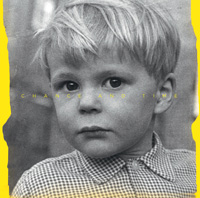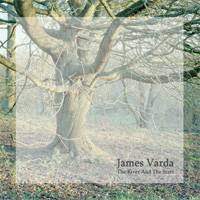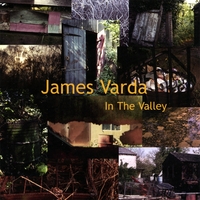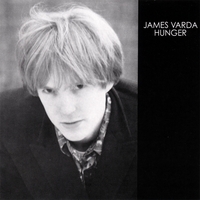Chance And Time (2014)

Quotes for Chance And Time
It is hard not to be moved by Varda’s stoic reaction to his fate and the way that he embraces more tightly the things that he loves. americanaUK
This is very much an album to cherish. Very highly recommended. Folk Radio
Chance And Time is an astonishing album. Varda is unmatched among British songwriters. Electric Lullaby
Chance And Time's reflections on love and loss and the conundrum of being human have a sureness of touch that few possess. R2 Rock’n’Reel
It’s an album of great truth and beauty. Nick Harper
Chance And Time may prove to be James Varda's final album and, if so, he ends on a high. whisperinandhollerin
Chance and Time is a towering monument of an album. Opher's World
Reviews of Chance And Time
James Varda is a voice deserving close attention. An unsung hero of the acoustic singer-songwriter scene who ever since 1988's Hunger has released a series of seriously impressive records. His latest Chance And Time is a case in point. It may well be his best to date.
Pastoral and reflective in tone Chance And Time is an engrossing, layered set. The songs are beautifully crafted, melodic acoustic pieces. Varda's lyrics, tenderly and precisely enunciated, abound with lyric references to the natural world and landscape of England. His arrangements are gentle on the mind but, make no mistake, this is no folksy ramble through the woods - there is an edge to Varda's writing: songs like The Doctor Spoke and We Won't Dream don't pull their punches however beautifully they are sung and played.
For all nature's balm, Varda reminds us that our lives are beset with uncertainty: ‘You try to plan and look ahead, but rails can become detached/And houses may come tumbling down’ (One Thing After Another’). A record for those moments of stillness and calm, Chance And Time's reflections on love and loss and the conundrum of being human have a sureness of touch that few possess. Colin Hall - R2 Rock’n’Reel
It is hard not to be moved by Varda’s stoic reaction to his fate and the way that he embraces more tightly the things that he loves. ‘Beside the Sea’ is a devastating love song told in twelve lines, it is also the most sonically adventurous song here with echoing piano chords, rumbling percussion and plucked guitar: ‘I’d pledged I’d always stay, but it is not to be, one day I’ll leave you here, beside the sea’, I can almost feel my own heart break. How you react to adversity tells you a lot about a person, this marks Varda out as someone to admire; these are naked emotions expressed with tenderness - it is difficult to listen to the songs knowing the backstory, or not, and not be moved. americanaUK
Read the full review: http://www.americana-uk.com/index.php/cd-reviews/item/james-varda-chance-and-time
Whilst Varda remains as much an enigma as he did with his 1989 debut, preferring the music to provide his biography this is very much an album to cherish. Folk Radio
Chance And Time is an astonishing album. As a chronicler of life, landscape, love and pain, Varda is unmatched among British songwriters. The lyrics, melodies and musicianship on Chance And Time are as good as you'll hear. James Varda plays, writes and sings better than ever and, in doing so, has produced the most powerful work of his career. This is a kosher, solid gold, five-star record. Electric Lullaby
Read the full review: http://nicktriplow.blogspot.co.uk/2014/11/new-music-james-varda-chance-and-time.html
9/10 - Ultimately, Varda's songs tell us as much about the human condition as they do of his own life. Singing "We come and go. That's all", on We Won't Dream, the final track, we can recognise this as a universal truth rather than a personal tragedy. Chance And Time may prove to be James Varda's final album and, if so, he ends on a high, bringing genuine warmth and wisdom to bear on 'difficult' subjects. Pass it on. whisperinandhollerin
Read the full review: http://www.whisperinandhollerin.co.uk/reviews/review.asp?id=11545
Chance and Time is a towering monument of an album. It deals with James’ reaction to being given the news of having a terminal illness. Most people would have crumbled or become introverted. That was not the case with James. He poured it into a feat of great creative affirmation of life. The naked emotion is so moving that I have never heard its like. The album fills you with the desire to make life count. I can only thank him for that gift. Opher's World.
The River And The Stars (2013)

Quotes for The River And The Stars
The album is a masterpiece, a perfect record. Late For The Sky*
This is a record of untold beauty. Maverick
This is a collection of songs that demands your attention R2 Rock‘n’Reel
It’s a precious thing to hear the voice of a man making music entirely on his own terms Flyinshoes
9/10...Beautifully crafted songs Whisperinandhollerin
The River And The Stars is a great album. I can’t recommend it enough. Electric Lullaby
Reviews of The River And The Stars
This is James Varda’s third album in 24 years. Hardly prolific, but for those who savour well-written, introspective songs performed in an achingly compelling voice, the wait between albums is well worth it. It was back in 1989 that James came to national prominence with the critically-acclaimed HUNGER. He toured with Roy Harper (an early supporter) appeared at Cambridge Folk Festival, Reading Festival and seemed set for a major breakthrough. But then he retreated from music, making a tentative return in 2004 with In The Valley, an album as enthusiastically received as his debut. But instead of capitalising on the positive reception afforded the album, he buried himself in rural Suffolk until he re-emerged with THE RIVER AND THE STARS. This is a record of untold beauty, the songs mainly inspired by his life and surroundings in Dedham Vale. This is emphasised by the stunning photos taken by Tom Need that appear in the CD booklet. These are deeply moving songs about life relationships … loss, longing, regret … all embraced in memorable melodies and exquisite musical arrangements that evoke memories of the very best singer-songwriters of the 1970s. Alan Cackett - Maverick
James Varda is a rare bird indeed, a folk singer who makes an impact with an album and then disappears from view completely. It happened after 1989’s Hunger and then again after 2004’s In The Valley. His debut album attracted a lot of attention and resulted in an appearance at Cambridge Folk Festival, amongst other things, but then…? His publicity makes no attempt to explain what happened to his muse (or his music-making) in the long gap between the first two albums and the slightly shorter gap between 2004 and this new collection of songs.
Reading between the lines of this rather beautiful new album you might assume any number of reasons that might affect a sensitive soul, driven to make music but filled with distaste for what it takes to put your music out into the world. No matter, really, because it’s a precious thing to hear the voice of a man making music entirely on his own terms. John Davy - Flyinshoes
Read the full review: http://flyinshoes.ning.com/profiles/blogs/james-varda-the-river-and-the-stars
If you’re going to make your fans hang on for seven years for your new album, you’d better be sure that you’ve made it worth the wait. Only his third album in a twenty-two-year recording career, James Varda’s The River And The Stars delivers on expectations wholeheartedly.
Right from the insistent opening chords of ‘These Times’, Varda sets out his agenda – honest music that catches the ears of listeners and asks them to invest their intellect and emotions in the experience. The stripped-back arrangements across the album only go to emphasise the concentration on meaning and melody.
Varda’s voice remains up front, and speaks with a gentle confessional intensity. Where other instruments rest alongside the acoustic guitar and vocals, they are carefully placed to enhance and complement the mood. Viola, mandolin, accordion and harp – they all sit perfectly within the songs.
Yet for all simplicity of the orchestration the sound is never sparse or empty. Even where acoustic guitar is the only accompaniment to the vocal, the music still sounds rich and full. Treading the boundaries between modern folk, classic singer songwriters and rock music, this is a collection of songs that demands your attention. Trevor Raggatt - R2 Rock‘n’Reel
With just three albums in 25 years, James Varda is like The Blue Nile of folk. These beautifully crafted songs are poetic reflections of a man in tune with the seasons. By now it is clear that James Varda is someone who prefers to stay out of the limelight but the high quality of his songs should ensure that he continues to build on his loyal, and patient, fan base. Martin Raybould - Whisperinandhollerin
Read the full review: http://www.whisperinandhollerin.co.uk/reviews/review.asp?id=10202
Sometimes, as Bob Dylan says, songs ‘say things everyone knows to be true’. But it’s a rare gift to say them in such a way that they take your breath away. The River And The Stars is a great album. I can’t recommend it enough. Nick Triplow - Electric Lullaby
Read the full review: http://nicktriplow.blogspot.co.uk/2013/08/james-varda-river-and-stars.html
In The Valley (2004)

Quotes for In The Valley
he's back! And this album is a quietly wonderful return. It's tender and introspective, consummately unassuming, and achingly affecting. This is an excellent album. Ross Fortune - Time Out
He's back with a gorgeously mature work Tim Perry - The Independent Newspaper
Exquisite. In The Valley is a lovely, sincere, at times moving piece of work. John Stacey - Comes With a Smile
James Varda's first album was released in 1988 and now he returns 15 years later with a beautifully written, highly individual, intimate album - composed, performed and recorded by Varda. Rough Trade Shops.
Reviews of In The Valley
Now here's a thing. Back in 1988, a youthful, floppy-fringed singer-songwriter by the name of James Varda released his debut (John Leckie produced) album to some fair acclaim. Describing itself as 'songs from the fog' with a 'part punk energy' it was a bold and promising work that evinced comparisons to the likes of Dylan (then, as now, the burden of any singer-songwriter), Roy Harper (who Varda toured with) and 'Suzanne Vega on acid' (a bit off the mark, that one). And then... nothing. Little was known about Varda. He was London-based, appeared from out of the ether, and then just disappeared, seemingly from whence he came.
Well now, some 15 years later, he's back! And this album is a quietly wonderful return. It's tender and introspective, consummately unassuming, and achingly affecting. I hesitate to mention the name Nick Drake, particularly as recent years have seen such a shameless slew of folky types welding themselves so vaingloriously to his name and sound and memory. But with Varda, it's more subtle and natural. There's something in the phrasing, the hushed tone, the soft gyre, the darkly rusted air.
Enquiries as to his whereabouts over the last decade and a half are fielded with a straight bat. 'I took a break from recording and playing live to sort a few things out in my life,' he says. 'But I never stopped writing songs.' This is an excellent album. Ross Fortune - Time Out.
In 1988,this English singer-songwriter released an album produced by John Leckie (Roy Harper, Radiohead), which kept him busy on the folk-rock circuit for a couple of years. He seemed to disappear after that, but he's back with a gorgeously mature work, on which crisp vocals and emotive recollections provide food for the heart and head. Tim Perry - The Independent Newspaper.
Sometimes all you need is a voice and a guitar. Sometimes plain, unadorned music, free of artifice, is sufficient. Sometimes the sound of one man strumming an acoustic guitar and singing songs in a clear, heartfelt voice is enough. Enough to help slough off the cares of the day as the music effortlessly envelops you. Such is the case with James Varda's exquisite In The Valley. Ten simple songs, recorded with care, that are uplifting and satisfying and bear repeated listening. Fans of Varda, of course, will appreciate that they have had a long wait to hear more of his work. For this release comes a mere 15 years - that's right, 15 years - after his previous work, Hunger. Since those heady days of his first album Varda has supported artists like Roy Harper and Townes Van Zandt and appeared at the Cambridge Folk Festival and the Reading Festival, plus doing various TV and radio performances. All that was a long time ago. To say the guy has, as his publicist says, kept a low profile most be the understatement of the century. Hunger was produced by John Leckie back in 1989, but this time Varda has opted to do it himself, creating a simple, spacious, warm sound. Some have compared him to Nick Drake, but Varda's work contains a degree of inherent optimism that Drake was not exactly renowned for. Standout track is the five-minute "That's The Time," a gorgeous rumination on ageing, the passing of time and the realisation that maybe you haven't achieved what you might have done. 'When you're weary and heavy and in need of a rest, and you finally realise that you won't be blessed, that's the time to give some thought to when your race is run.' In The Valley is a lovely, sincere, at times moving piece of work. I only hope we don't have to wait another 15 years for the follow-up. John Stacey - Comes with a Smile.
It’s been almost fifteen years since James Varda dropped off the radar, following a brief flirtation with the spotlight that included one album produced by John Leckie (Stone Roses, Dr John, Muse) and tours with the likes of Roy Harper and Townes van Zandt, as well as an appearance at the Reading Festival. Since then, nothing, though one suspects he spent his time living and loving. He may not have been missed, but his return is welcome, for his intimate, heartfelt and honest style of performing - just his voice and an acoustic guitar - recalls the acuity of early James Taylor or a honeyed Richard Thompson. James Varda’s valley may not be exotic, but it is an enticing, mysterious place where you can get lost and still feel safe. Gillian Nash – Logo Magazine.
Hunger (1988)

Quotes from the original release
Songs that wrench at your heart strings and make you think Time Out
Startling. Articulate. Passionate Music Week
James Varda is an artist that makes you sit up and take notice.
Johnny Walker DJ
Film-noir vignettes cloaked in obscure but captivating poetic imagery with some brilliant guitar work. Melody Maker
There is a substantial depth to Varda Q Magazine
This man with an acoustic guitar bridges many gaps and is not easily categorised. You could call him anything from country to punk... and you’d probably be wrong at the end of the day. The Irish News
Quotes from the 2008 reissue
Hunger is a great album by the excellent James Varda Tom Morton BBC Radio Scotland
Even after nearly twenty years, the album sounds deliciously fresh. Recommended to anyone who admires great songwriting. DPRP
Reissue of a 1988 album from a UK singer/songwriter with his own unique style – stark, dark, and powerful. The Big Takeover
It’s a bleak work, then, but also a thrilling one. Erasing Clouds
Hunger was originally released in 1988 and garnered Varda much praise. Now, in the wake of his critically acclaimed 2004 comeback album In The Valley, it's being reissued by Small Things Records. Acoustic Magazine
Reviews From the Reissue of Hunger
'Just a Beginning', the first song on James Varda’s album Hunger is an immediately riveting, stark song that on first listen I was sure was some long-lost pop-rock classic that I hadn’t heard before. And I was partly right -- Hunger was originally released in 1988, the debut album of a young musician who brought his guitar to London and started playing around town. A musician who would not release another album for 15 years.
'Just a Beginning' is riveting for its starkness, and the way the singer sounds thoughtful and hopeful despite the heartbreak of the song he’s singing. “Say we’ll always be lonely / it’s just the way of the world,” he sings, while strumming a lone guitar, and later playing some sweet and lonely harmonica. In a way it’s the most hopeful song on the album, though its resolution is ambiguous. The “beginning” he sings about is a rejection of modern society in a way, but not as harsh a one as nearly every other song on the album.
The portrait of London, or the world by relation, on Hunger is not a becoming one. The world has gone mad, war its manifestation. Hunger’s power comes from Varda not ranting, not taking a polemical or political angle. His anger seems more existential than that, his targets deeper. “I’m getting off this train,” he sings about leaving his country, but it isn’t clear that another country will be any better. The final lyric on the album, during the stormy “Black on Black”, is “the black sky about to detonate.”
It’s a bleak work, then, but also a thrilling one. The album’s spontaneous recording process, noted by Varda in the liner notes, is no doubt part of what makes the album feel like a rush of passion, an outburst of anxiety captured in passing, like a Polaroid. A snapshot of the impending apocalypse, perhaps, but we’re still here, as is Varda, and in the album’s more hopeful moments it seems aware of that future as well. Dave Heaton - Erasing Clouds
Cast your mind back twenty years, if your age allows you to do so! I was living in the midlands of England, earning my first proper salary after years of gaining degrees and fraternal scorn for 'living off the state' and thoroughly enjoying the vibrant local music scene. Every year one could guarantee a tour by such great acts as John Martyn and Fairport Convention. Heck even Loudon Wainwright III and Ted Hawkins made it over to these shores once in a while. But the most hotly anticipated on the circuit was Roy Harper. Sometimes alone, sometimes with another acoustic guitarist, but always engaging, one man and an acoustic guitar putting on a complete show. Complete in those days meant a support act, and for a brief period in 1988 that act was one James Varda. An aggressive and acerbic songwriter, an energetic performer with songs to match. Hard to define, progressive folk comes close, but then again is still so far away. An album, Hunger, recorded at Harper's home studio, was released on the independent Murmur label to great critical acclaim and then... Nothing.
Skip forward 15 years and I was transferring some vinyl albums to CD, stuff that was unlikely to ever be released on digital format, forgotten albums by forgotten bands and I came to 'Hunger'. Piqued by curiosity as to what had happened to such a promising artist I attempted another web search, such as I had done several times in the past with no tangible results. Lo and behold, out of nowhere there had appeared a James Varda website set up by the man himself with a new album to boot (2004's In The Valley). Slip forward another few years to the present day and rather expectantly a brand new, freshly remastered, digitalised version of Hunger comes through the letter box, all hail!
Even after nearly twenty years, the album sounds deliciously fresh, thanks in no small part to the great production by none other than John Leckie. As Varda had principally only played solo with an acoustic guitar and harmonica as musical accompaniment to his vocals, there were no arrangements for a band and no time for rehearsals either so everything was done spontaneously in the studio, another factor why the album stands up today and does not sound at all dated. As mentioned above, the music is hard to really define; original reviews from 1988 evoked comparisons with Labi Siffre, The Jesus And Mary Chain, Bob Dylan and Joy Division. Others claimed Varda "evokes memories of the creative majesty of Roy Harper" or could be considered an "in-tune Billy Bragg". Varda is all this and a lot more. The melodic melancholy of Sunday Before The War, the intensive fury of I Can't Stand It and the poetic madness of "If all the beauty of the world, was just a page in history, and all the women came and prayed, at the altar of mystery. Strange Weather". This latter song features Nick Harper on lead guitar and I would be bold enough to suggest that Harper Junior's exposure to Varda had an influence on the way that he attacks his acoustic guitar. Indeed, songs like This Train Is Lost would slot easily into a Nick Harper solo performance.
Crawl In The Pen is Dylanish in its lyrical delivery and although intense and rather uncompromising, still maintains an oblique optimism. Much could be said about the album as a whole, even the bleakest lyrical song, In My House, is countered with an upbeat arrangement complete with jaunty harmonica line. Okay, so not a typical progressive rock album by any definition, but in the words of Lynne Robinson of New York's X-Poseur magazine "This is a cool record". Recommended to anyone who admires great songwriting. Mark Hughes DPRP
Originally released back in 1988 and issued on CD for the first time, Hunger appeared at a time when singer-songwriters were about as welcome as a bad case of flu. Consequently, it was largely overlooked. Even at this distance though, it's easy to spot the influences, yet it still manages to retain a freshness and vitality often lacking from the current crop of singer-songwriters. There's quality here - on 'Sunday Before The War', in the rolling rhythm and melodic charge of 'This Train Is Lost' the cutting, acoustic rocking and paranoia of 'Crawl In The Pen' and the closing, darkly atmospheric 'Black On Black'; they've all stood the test of time and stand as testament to the faith Roy Harper had in the young unknown who thrust a demo into his hand, and ended up recording his debut at Harper's studio.
In The Valley, released in 2003 is a slicker, more considered affair, his earlier frantic approach replaced by a quietly unassuming, thoughtful delivery, where gently finger-picked guitar and an unhurried ambience offer entry into his contemporary writing. Listening to the albums back to back allows the subtle assuredness of songs such as 'I'm The One', the observational autobiographical title track 'In The Valley' and the poetic conversational approach of closer, 'If This Book', to reveal a songwriter merely getting into his stride. Danny Moore Rock’n’Reel: May/June 2008